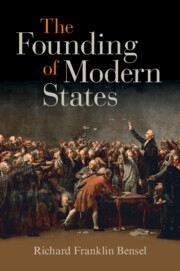1 - Introduction
Published online by Cambridge University Press: 27 October 2022
Summary
Six modern foundings are examined in this book. Three of them involved the creation of non-democratic states: the dictatorship of the proletariat that arose out of the Russian Revolution; the fascist regime brought to life in 1933 Germany; and the Islamic republic that emerged during the Iranian Revolution. While fascinating in their own right, these will serve as a useful foil for the founding of three states whose sovereignty rests, in whole or in part, on their dedication to those principles we have come to associate with traditional democracies: the unwritten English Constitution as the embodiment of the rights of Englishmen; the American Constitution that was created after those rights of Englishmen were denied to the colonists; and the French Revolution that asserted the rights of man as a justification for its demolition of monarchy and the decadent remains of feudalism. However, as will become clear in the examination of these cases, the distinction between non-democratic and democratic foundings largely depends on the normative commitments of the beholder.1
- Type
- Chapter
- Information
- The Founding of Modern States , pp. 1 - 14Publisher: Cambridge University PressPrint publication year: 2022

